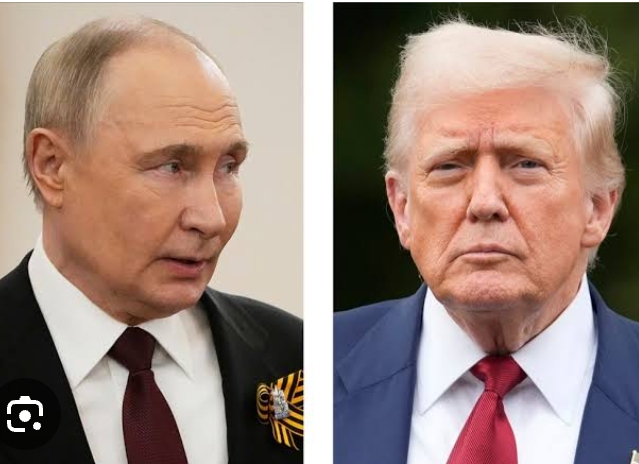NEWS
JUST IN”Russia issues brutal response to Donald Trump’s Ukraine comments as war tensions heighten”…SEE MORE 👇 👇

JUST IN”Russia issues brutal response to Donald Trump’s Ukraine comments as war tensions heighten”…SEE MORE 👇 👇
Russia Strikes Back: The Context of Trump’s Ukraine Remarks
Over recent months, former U.S. President (and current Republican presidential candidate) Donald Trump has made increasingly pointed and critical statements concerning Russia’s invasion of Ukraine. He has at times cast doubt on Moscow’s strength, accused Russia of failing strategically, and expressed support for Ukraine’s capacity to reclaim lost territory.
In response, Russia—through its official spokespersons, media organs, and political elites—has delivered blistering rebuttals. These responses reflect not only a pushback to Trump’s rhetoric, but also a broader effort by the Kremlin to signal resolve and deter perceived interference in what it views as its strategic sphere.
The Nature of Russia’s “Brutal Response”
1. Dismissal of Trump’s language as weakness or ignorance
Kremlin officials have publicly rejected Trump’s portrayal of Russia as weakened or brittle. For instance, Russian spokesman Dmitry Peskov strongly denied suggestions that Russia is in economic collapse or military decline.
Reuters
Media commentary and occasional statements by figures like Dmitry Medvedev have characterized Trump’s ultimatums and criticisms as theatrical, hypocritical, or strategically naive.
The Moscow Times
+1
2. Emphasis on existential stakes
Russia has framed the war in Ukraine as an “existential” issue for itself. When Trump contrasted Moscow and Kyiv as “fighting children,” the Kremlin pushed back vigorously, stating that Ukraine’s war is deeply tied to Russia’s core national interests and future security.
mint
By casting the conflict this way, Russia seeks to portray its objectives as non‑negotiable and vital to its survival, rather than mere territorial ambition.
3. Threats and signals of escalation
In more aggressive tones, some Russian voices have implied that further Western pressure—including from Trump—could provoke retaliatory measures. Some comments suggest readiness to respond not just diplomatically but with force or other “appropriate” steps, should the U.S. or its allies cross certain red lines.
New York Post
+1
Although the Kremlin often frames such statements as defensive deterrence, they underscore rising tensions and the stakes felt by Moscow.
4. Delegitimization and narrative control
Russia also engages in narrative warfare to discredit Trump’s critique. The Kremlin and its affiliated media tend to portray Trump’s remarks as propaganda or part of a Western campaign to demonize Russia. They attempt to flip the narrative, suggesting that Trump is naive, misinformed, or puppeteered by anti‑Russia interests.
This tactic serves dual goals: dampening domestic and foreign credibility of Trump’s claims, and reinforcing Russia’s position as the aggrieved party resisting external meddling.
Why the Strong Reaction?
Russia’s severe reaction to Trump’s statements is not just rhetorical posturing; it has deeper motivations:
Maintaining strategic deterrence. Russia wants to avoid being seen as bullied or coerced by U.S. rhetoric, especially from an influential figure like Trump. A harsh counter helps preserve the image of strength and resolve.
Defending legitimacy and narrative control. Russia invests heavily in controlling how the war is framed—both domestically and internationally. Challenges from Trump risk undermining that narrative.
Preempting diplomatic interference. By responding forcefully, Russia signals to foreign powers, including the U.S., that interference or ultimatums may draw consequences.
Signaling internal cohesion. Harsh public responses help rally domestic support and suppress dissent by presenting a unified front against outside criticism.
Implications for the War and International Relations
Escalating rhetorical and geopolitical tensions
Trump’s remarks, and Russia’s responses, feed into a vicious cycle of escalating rhetoric. Each side’s denunciations raise the temperature, making diplomacy more fraught and accidental miscalculations more likely.
Risks to U.S.-Russia diplomacy
If Trump’s statements are interpreted as a shift in U.S. posture, Russia may reassess its own willingness to engage. Talks or ceasefire proposals may become more difficult unless clear boundaries and mutual respect are affirmed.
Strain on alliances and messaging
Trump’s criticisms may also create tension within the U.S. and among its allies over how to balance strong support for Ukraine with restraint in confronting Russia. Divergences in tone or policy could complicate coordinated action on sanctions, aid, and defense.
Impact inside Ukraine
For Kyiv, Trump’s words are double-edged: they can boost morale (by publicly supporting Ukrainian capability) but also risk giving Moscow fodder to claim Western overreach. The Ukrainian leadership must tread carefully, as misalignment with Western partners or internal factions could weaken its diplomatic position.
Conclusion
In an accelerating war zone marked by high stakes, harsh rhetoric, and deep distrust, the clash between Trump’s Ukraine commentary and Russia’s brutal countermeasures is emblematic of the larger conflict. Russia’s response is far from mere insult—it is a strategic move to defend its narrative, maintain deterrence, and unsettle any external intervention.
As tensions heighten, the world will be watching how this dispute plays out. Will diplomacy survive the heat? Or will these verbal volleys signal a deeper entrenchment of opposing sides?
I











